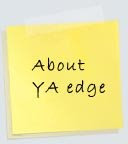Early into our challenge I found out that a journalist friend of mine, Tracy Wasylow (I know – another Tracy – I personally have a ton of "Tracys" in my world), had left her position at our small town paper to pursue other non-writerly employment. Knowing Tracy also had a WIP tucked away somewhere, which she was keen to dig into, I wondered how her adjustment from writing for a paper to writing fiction would unfold.
She kindly offered to share her thoughts with us here at YAedge.
____
 Ever since I was little, I've been making up stories.
Ever since I was little, I've been making up stories.It wasn't until I stumbled into journalism in college I figured out there were ways other than being a novelist to write for a living (and you will find the majority of journalists are in fact writing novels - they became journalists to pay the bills).
For the past eight years I've put everything I had into becoming a part of a community and writing about the lives and events that mattered to those people.
It's a tiring job. You're never off. Not while you're in the area you write about.
People flag you down in stores to tell you what they did and didn't like in the articles you wrote. They suggest how you could make things better. They give you names of people they think are interesting and should be written about. They want to hear the latest gossip, and have a hard time differentiating between what is just gossip and what is real.
When you write for a newspaper for a living, you are accountable to every single person who reads your words. If there is a spelling mistake, a grammatical mistake or, worst of all, a mistake in someone's name, they have no problem calling you up (in some cases at home) and giving you a piece of the collective community mind on some perceived error.
As a journalist, it's easy to forget what time it is, what day it is, and yes, even sometimes what year it is.
In community newspapers that only come out once a week, you're constantly working a week in advance. You are on deadline every single day. There are no room for errors and absolutely no excuses for sloppy work.
There are pieces that need hours of research, interviews and rewrites.
In community journalism, you don't get that kind of time. Unless it's a feature piece. If it's a breaking news story, you have less than no time and it will never be long enough, clean enough, fast enough.
This is why you'll find most journalists are also speed readers. We have to be. But after awhile, it leaks into our personal lives.
There was a point the joy I used to get from reading a book was leached out of the process because I was far too busy just trying to get through it.
Now, after stepping back from journalism, I find myself slowing down. I know what the date is. I don't have a deadline for the things I'm writing. And I can make mistakes because I'm now accountable to the only one person in the audience - me.
-- Tracy Wasylow










2 comments:
Great post! Thanks to both Tracys! I love hearing interesting stories about professional writers. It shows me that most people don't love their jobs, even if they are doing something they love!
Ya...Tracy did an awesome review of my band's CD - and a cool interview of us...oops, I guess we were some of the bla bla people! ;0
Post a Comment